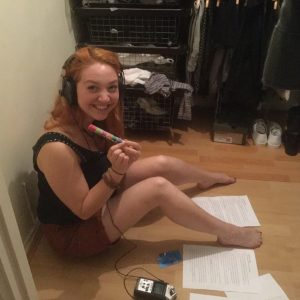So you’ve got a great script and you want to turn it into an effective audio drama. How do you get an actor to lift a piece of writing off the page using their voice alone?
You may not realise it but a smile can be heard on radio. You don’t need to be able to see it in order to hear it. That’s good news for an actor. They can trust that much of what they do in other acting media will translate to radio.
Radio acting isn’t just about standing passively in front of a microphone. At the BBC’s Broadcasting House the radio drama studio consists of a whole set, including a working kitchen, ‘exterior’ and ‘interior’ spaces, and on-set doors for entering and exiting. It’s similar to a stage set but with microphones and the actors move around it much as they would on stage.

Okay, so my cupboard isn’t a professional recording studio, there’s limited space for a start, however the same principle applies – physicalising a performance helps it sound convincing. When Jamie Finn’s character in Abe Buckoke’s piece Out at Sea (out soon) is kicking his way out of a crate, Jamie was doing sit ups and kicking his legs in the air with his head inside a recycling bin! His physical effort can then be heard in his voice. Obviously, it’s not possible to recreate everything physically. Jamie wouldn’t have been too happy when his character jumps in the sea! Some things you just have to act.
Often radio drama studios have someone to do spot effects – ‘live’ sound effects like stirring a cup of tea or pouring a glass of water. They are recorded during the performance. This avoids messing around with fiddly editing in post-production and ensures the effects are timed with and take place in the same acoustic space as the vocals.
If you don’t have the luxury of a spot effect person then the actor can do it. When performer and writer Bexie Archer opens a pack of Mentos in Second-hand Meringue (coming soon) she is actually opening a pack of Mentos. We chomped our way through at least two packs that day! That’s not a reflection of the number of takes it was just pure greed!
Likewise when Ajjaz Awaad’s character in Just Joella is taking out objects from a Herschel bag, Ajjaz is taking things out of a bag. Okay, not a Herschel bag but she does take out an actual pair of knickers! The advantage of an actor doing their own spot effects is that it enables them to commit imaginatively and it sounds more real.
They can also help an actor get their timing right. Bexie’s character is outside a toilet in which her sister has locked herself. Bexie used the cupboard door as a substitute for the toilet door which allowed her time to her responses to, for example, the sound of her sister unlocking the door. The real toilet door sound effects were added later in the same rhythms Bexie had established during the performance.
So acting for audio drama is physical and involves handling objects much in the same way as on stage. But how does an actor pitch their performance correctly? Size matters – too big and you’re affectively shouting in someone’s ear, too small and you’ve lulled the listener to sleep. Performance poet Alex Harvey who created Unravel is used to performing to large crowds, so his challenge was to reign in his performance without losing its energy. Listening to his first recording through headphones helped him to deliver a more intimate performance.
Above all, an engaging performance requires an actor to tell the story, to know who they are telling it to and why. Radio production is fast; there is little time for rehearsal or character analysis. An actor needs to be prepared and know the script well in advance. Good sight reading skills, quick wits and the ability to be spontaneously creative are a must. Many actors love this as there is no time to get bored!
In an industry which employs actors primarily for the way they look, acting for audio drama can be incredibly liberating as it allows actors to take on all sorts of roles they wouldn’t ordinarily be cast in.
At present the BBC produces most of this country’s radio drama, with the Radio Drama Company employing a core team of ten actors who get to do a wonderfully diverse range of work. My hope is Podium will play a part in the audio drama revolution and provide even more actors with the opportunity to create new and exciting work.
Listen here to Alex Harvey’s Unravel:
By Cordelia Galloway
Head of Drama Podium.me